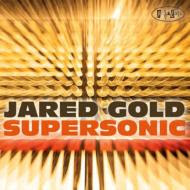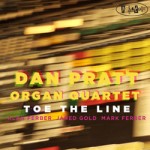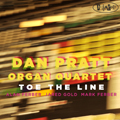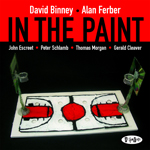http://www.criticaljazz.com/2012/05/dan-pratt-toe-line-posi-tone-2010.html
Tag: Alan Ferber
Listener’s Notes – From the CD Stack: Gold, DPOQ….
http://markehayes.blogspot.com/2010/08/listeners-notes-from-cd-stack-gold-dpoq.html
Listener’s Notes – From the CD Stack: Gold, DPOQ
 The one album I queued up most often was organist Jared Gold’s Supersonic (Positone 2010). Gold — the musician, NOT the goth fashion designer— has played with Dan Pratt, Randy Napoleon, and Avi Rothbard, but many people will likely know Gold’s work from guitarist Mark Stryker’s excellent 2007 release, The Chaser. On Supersonic, Gold roots himself in the classic organ trio combo, with Ed Cherry on guitar and McClenty Hunter on drums. Every track on the album has its rewards: uptempo numbers are clever and funky, ballads are cool and soulful, and interplay between band members is balanced. I’m sure I’m not alone in my deep appreciation of the opening track, a brisk reworking of John Sebastian’s theme from Welcome Back, Kotter. With an opening like that, Supersonic grabs you from the start and doesn’t let go. A thoroughly groovy time.
The one album I queued up most often was organist Jared Gold’s Supersonic (Positone 2010). Gold — the musician, NOT the goth fashion designer— has played with Dan Pratt, Randy Napoleon, and Avi Rothbard, but many people will likely know Gold’s work from guitarist Mark Stryker’s excellent 2007 release, The Chaser. On Supersonic, Gold roots himself in the classic organ trio combo, with Ed Cherry on guitar and McClenty Hunter on drums. Every track on the album has its rewards: uptempo numbers are clever and funky, ballads are cool and soulful, and interplay between band members is balanced. I’m sure I’m not alone in my deep appreciation of the opening track, a brisk reworking of John Sebastian’s theme from Welcome Back, Kotter. With an opening like that, Supersonic grabs you from the start and doesn’t let go. A thoroughly groovy time. Gold provides support in the second release from the Dan Pratt Organ Quartet, Toe The Line (Positone 2010) , a thoroughly confident second release from the saxophonist’s group, which is rounded out by trombonist Alan Ferber and drummer Mark Ferber. Powerful and precise, both Pratt and Alan Ferber carry every tune forward with a clear sense of working together, then playing off each other when the moment calls for it. Gold and Mark Ferber fill the remaining sonic space masterfully — no easy task given the challenging nature of Pratt’s compositions. The excellent playing aside, what is most remarkable about Toe The Line is the writing. Aside from the Ellington tune, “The Star Crossed Lovers,” every song is a Pratt composition. From the angular bebop opening of “Minor Procedure,” to the Monk-ish “Doppelganger,” to the whimsical “Uncle Underpants,” and to the souful, gorgeous “After,” Pratt has put together a range of songs that leaves little doubt as to the prowess of his songwriting skills. Toe The Line gets better each time you listen — on the strength of the songs.
Gold provides support in the second release from the Dan Pratt Organ Quartet, Toe The Line (Positone 2010) , a thoroughly confident second release from the saxophonist’s group, which is rounded out by trombonist Alan Ferber and drummer Mark Ferber. Powerful and precise, both Pratt and Alan Ferber carry every tune forward with a clear sense of working together, then playing off each other when the moment calls for it. Gold and Mark Ferber fill the remaining sonic space masterfully — no easy task given the challenging nature of Pratt’s compositions. The excellent playing aside, what is most remarkable about Toe The Line is the writing. Aside from the Ellington tune, “The Star Crossed Lovers,” every song is a Pratt composition. From the angular bebop opening of “Minor Procedure,” to the Monk-ish “Doppelganger,” to the whimsical “Uncle Underpants,” and to the souful, gorgeous “After,” Pratt has put together a range of songs that leaves little doubt as to the prowess of his songwriting skills. Toe The Line gets better each time you listen — on the strength of the songs.
Traditional jazz gets a modern sound.
Dan Pratt Organ Quartet – Toe the Line – Posi-Tone Records PR8059, 59:31 ****:
(Dan Pratt, tenor saxophone; Alan Ferber, trombone; Jared Gold, Hammond B3 Organ; Mark Ferber, drums)
Dan Pratt has rapidly established himself as a force in the modern jazz movement. In high school, he performed with the Monterey Jazz Festival High School Band, and then attended the Berklee School of Music in Boston. The prestigious Thelonious Monk Institute would also help in developing his performance and composition skills. He has become a fixture in the burgeoning Brooklyn, New York jazz scene, playing with a wide array of accomplished musicians. The Dan Pratt Quartet was formed in 2001.
The latest offering, Toe The Line, is an ambitious, creative step in the maturation of this artist. The nine tacks, including eight original pieces, emphasize the synergy of the quartet, while exploring various sounds, melody and rhythm shifts, and improvisation. The members are able to experiment with different tones and playing styles.
On the opening track, “Houdini”, the drum and organ lay down a groove beat, as the saxophone and trombone play dual lead, and swap solos. There is a sophisticated take on the Ellington-Strayhorn “Star Crossed Lovers” that showcases the two horns in a soft counterpoint, moving into a bluesy ballad, with a whimsical organ background. Jared Gold’s organ play is featured in many different styles, allowing him to rise to the level of the writing. He lays down an incandescent solo on the title track, “Toe The Line”, and shows a funky groove feel on “Wanderlust”, and “Minor Procedure”. Mark Ferber’s drumming is integral in the cohesion of the sound, and his solo on “Uncle Underpants” delivers a ferocious backbeat.
Pratt’s saxophone work is textured on every song. He manages to trade riffs with trombonist, Alan Ferber in a seamless manner. On the hard bop Doppleganger there are energized and smooth trombone solos. The final song, “After”, is a soulful and moody ballad, with a notable saxophone opening solo and church organ accompaniment. The song builds to a harmonious, gospel crescendo that finds the group at its best, again.
TrackList: Houdini; Minor Procedure; Wanderlust; Doppelganger, Star Crossed Lovers; Toe The Line; Stoic; Uncle Underpants; After.
— Robbie Gerson
31 Days Of Album Reviews #23: Dan Pratt Organ Quartet, “Toe The Line”
burningambulance.wordpress.com
DAN PRATT ORGAN QUARTET
Toe the Line (Posi-Tone)
 Tenor saxophonist Dan Pratt has been leading this group for close to a decade; its debut CD,Springloaded, was released in 2003. Toe the Line is the quartet’s first CD on Posi-Tone, a retro-ish label I’ve started to really admire. They focus their attention on groups that mix modernity and classicism, that swing hard and have a feel for the blues but demonstrate a willingness—and sometimes an eagerness—to stretch the boundaries of post-bop. The result is a catalog full of unassuming gems like this one.
Tenor saxophonist Dan Pratt has been leading this group for close to a decade; its debut CD,Springloaded, was released in 2003. Toe the Line is the quartet’s first CD on Posi-Tone, a retro-ish label I’ve started to really admire. They focus their attention on groups that mix modernity and classicism, that swing hard and have a feel for the blues but demonstrate a willingness—and sometimes an eagerness—to stretch the boundaries of post-bop. The result is a catalog full of unassuming gems like this one.
In addition to Pratt, this quartet features Alan Ferber on trombone, Jared Gold on organ and Mark Ferber on drums. The absence of a bass player gives the music a jumpy, not-quite-anchored feel that’s emphasized by Ferber’s drums, which are mixed with lots of room sound and a sharply ringing snare. Pratt and Ferber are a tightly bonded team, charging through melodic heads and offering each other intuitive harmonic support. The unison lines of “Doppelgänger,” with Ferber meeting Pratt’s saxophone at the bottom of the trombone’s range, are hypnotic and gripping. Gold’s organ is occasionally more hockey-rink than roadhouse, but at least he’s not a psychedelic explorer like Larry Young; he chugs along beneath the horns, letting them do most of the work and only occasionally erupting. His florid, half-gospel/half-soap opera performance on the ballad “The Star-Crossed Lovers” can’t be overlooked, though, and he totally dominates the title track. And on the closing “After,” which begins with an unaccompanied solo from Pratt, everyone sinks knee-deep into passionate, churchy blowing.
This is a really solid, hard-grooving album featuring excellent performances by four guys who’ve had a long while to get to know each other and figure out not only each player’s individual strengths, but how to combine those in surprising and impressive ways. Toe the Line does anything but. Highly recommended.
1. Do I foresee myself listening to this record again? Oh, yeah.
2. Should you buy this record? Absolutely.
Here’s another review for our new Dan Pratt Organ Quartet record “Toe the Line” featuring Alan Ferber, Jared Gold, and Mark Ferber…
Toe the Line is a phrase which signifies unwavering obedience to a doctrine, structure, or rule, but the Dan Pratt Organ Quartet defies such a rule. The group conforms to the rule of playing with flair, but little else.
Pratt, who plays tenor saxophone, was a member of the Monterey Jazz Festival High School All-Star Band, and his professional career includes work with Joe Lovano, the Vanguard Jazz Orchestra, and the Christian McBride Big Band.
“Houdini,” the first of eight Pratt originals, opens with organ and drum laying down the rhythm. Pratt leads, echoed by Alan Ferber. The tenor and trombone harmonize, and at times they overlap each other. Shortly into the piece, Pratt takes off a bouncy, freestyle solo; Ferber solos as well. Throughout, organ and drums are in grooves of their own.
“Doppelganger” is aptly named. The term refers to the double of a living person—someone who bears a strong resemblance to another. The tenor begins a phrase and is joined by the trombone. At times, it’s difficult to tell which instrument is playing. Then the tenor plays the phrase at a higher tone. After the opening sequence, Alan Ferber and Pratt take turns with solos. Jared Gold’s organ serves not only as the rhythm instrument but also as the bass—a function it provides on all tracks. The horns revert to the opening phrase, playing without accompaniment at first. Then Mark Ferber joins in, skillfully playing snare, toms, and cymbals as if it were his solo. The song ends with sax and trombone harmonizing on the thematic phrase.
The lone cover, “The Star-Crossed Lovers,” is performed with as much vigor as Pratt’s compositions. The leads are solid, and the solos are engaging. In this sense, Toe the Line does conform to one rule: the musicians play from the heart.
Track listing: Houdini; Minor Procedure; Wanderlust; Doppelganger; The Star-Crossed Lovers; Toe the Line; Stoic; Uncle Underpants; After.
Personnel: Dan Pratt: tenor saxophone; Alan Ferber: trombone; Jared Gold: organ; Mark Ferber: drums.
Here’s a new youtube video clip for the title track of the Dan Pratt Organ Quartet CD “Toe the LIne”….
Another positive review for Dan Pratt Organ Quartet “Toe the Line”….
 by Derek Taylor
by Derek Taylor
masterofasmallhouse.blogspot.com
The Hammond organ is a hardy instrument, having weathered waxing and waning popularity since pioneers like Fats Waller and Bill Doggett brought it prominence as a viable jazz voice. Still, the number of players who opt to apply it to adventurous settings remains relatively few compared to the legion content to toe the line of convention. Saxophonist Dan Pratt and organist Jared Gold choose the less traveled path on this second disc by Pratt’s working quartet. Gold is an important part of a recent release by guitarist Jeff Stryker also reviewed in these virtual pages. The difference in his playing in that context compared to here is instructive as to just how well Pratt is able to press the best from his partners by giving them plenty to work with.
Pratt’s writing for the band is its principal asset. Each of the nine originals brims with ideas and novel avenues for execution. “Houdini” and “Minor Procedure” work of tightly wound heads and bright, bustling rhythmic structures. Gold builds throbbing bass lines and whirring fills that make the most of his instrument’s variable tone settings. “Wanderlust” opens with syrup-thick sustain and weirdly warbling effects that instantly place the tune apart. On “Star Crossed Lovers” and the closing “After” Gold traffics in luminous, church-appropriate swells that resist tipping over into treacle. The Brothers Ferber, Alan on trombone and Mark on drums, complete the band and are equally essential to the constantly shifting sound that reflects the players in nearly all manner of component groupings. Alan works like the cooling balm preceding the burning heat of Pratt’s improvisation on “Dopplegänger”, his rounded lines transmitting with an almost tactile smoothness.
Other pieces in the program cover different bases from the rock-inflected patterns of the title piece that works off another monster snaking bass line from Gold and a string of dynamic drum breaks to the vaguely Latin groove of “Stoic”, which again features the unflappable ingenuity of the drummer’s textured stick play. Trading in humor and tradition, “Uncle Underpants” gains momentum as a spiraling Pratt-penned head irons out into a stomping funk vamp. Ferber’s malleable backbeats soon reach street band fervency and he virtually steals the track with a galloping extended break. Pratt and his colleagues have been gigging quite regularly and the multiple merits of this release are certain to extend that employment streak. It’s a set custom-designed for skeptics who consider organ dates strictly old hat.
Check out this new youtube video clip for “Minor Procedure” taken from the new Dan Pratt Organ Quartet CD “Toe the Line” ….
Dan Bilawsky’s poignant review of the new Dan Pratt Organ Quartet CD “Toe the Line” taken from AAJ.com ….
 Toe The Line
Toe The Line
Dan Pratt | Posi-Tone Records (2010)
By Dan Bilawsky
Toe The Line does far more than its name implies. Saxophonist Dan Pratt has put together a record that, while loyal to the “small organ group” tradition, also manages to cover broad stylistic ground. Within this category, certain norms or standards seem to be expected in the music: Jimmy Smith’s records provide a grooving and intense blues-based sound; Larry Young’s albums have an adventurous streak; and modernists like Sam Yahel often create otherworldly aural collages. Organist Jared Gold takes from all of these ideals and creates his own sound, owing to everybody and nobody all at once, throughout this program.
Pratt penned eight of the album’s nine tracks, and the urgently energetic tunes seem to stand out. “Houdini” moves back and forth between a funky feel in seven and a straightforward swing section in four, with Pratt and trombonist Alan Ferber acting as a powerful tag team combination. The catchy, rhythmically-charged melodic motif on “Doppelgänger” sharply contrasts with Gold’s mellow organ work here and the enthusiastically choppy funk of “Uncle Underpants” is a musical delight.
Drummer Mark Ferber proves to be a tremendous asset to the band, as he helps to establish different feels for each song. His freely executed solo introduction on “Stoic”—set-up with some ominous cymbal and tom statements—helps to set the mood. Ferber also drives the band, whether simply swinging or trading solos, on “Minor Procedure.” The drummer even backs a Pratt solo—as the lone accompanist—on the title track, which includes some spectacularly sinister organ work from Gold.
Both horn players also excel on the more sensitive material. The opening of Duke Ellington and Billy Strayhorn’s “Star Crossed Lovers” features some gorgeous saxophone work from Pratt, with a gently rising and falling trombone line behind him. Both Pratt and Alan Ferber, backed by Gold’s subdued and churchy organ work, also deliver the goods on the slow and soulful “After,” which ends the album in a mellow and satisfying way.
Track listing: Houdini; Minor Procedure; Wanderlust; Doppelgänger; Star Crossed Lovers; Toe The Line; Stoic; Uncle Underpants; After.
Personnel: Dan Pratt: saxophone; Alan Ferber: trombone; Jared Gold: organ; Mark Ferber: drums.
John Kelman’s AAJ review for our David Binney/Alan Ferber CD “In The Paint”……
By John Kelman
With an influence felt, perhaps, as much or more in the work of others than in his own record sales, alto saxophonist David Binney rarely co-leads groups, but his longstanding collaboration with pianist Edward Simon has been fruitful in more ways than one. Sharing compositional and conceptual duties frees him to focus more on his playing, and that’s always a good thing, as Binney’s innovative writing has sometimes overshadowed the fact that he’s also a damn fine performer. Co-leading brings even greater breadth to the table, making In the Paint—a first-time shared leadership with trombonist Alan Ferber—another inspired pairing.
Nearly 15 years Binney’s younger, Ferber has been increasingly in the public eye on guitarist Charlie Hunter’s succinct Gentlemen, I Neglected to Inform You You Will Not Be Getting Paid (Spire, 2010), bassist Todd Sickafoose’s remarkable Tiny Resistors (Cryptogramophone, 2008) and percussionist/composer John Hollenbeck’s equally outstanding Eternal Interlude (Sunnyside, 2009). He also guested on Binney’s last album with Simon, Océanos (Criss Cross, 2007), but with In the Paint his voice is more definitive—splitting compositional duties with Binney nearly down the middle, alongside an uncovered gem and three freely improvised alto/trombone duets that demonstrate the leaders’ shared propensity for pulling surprising form from the ether.
Despite being instantly recognizable, Binney’s writing remains fresh and unpredictable. With a septet also featuring the twin-chordal attack of pianist John Escreet and vibraphonist Peter Schlamb, and a rhythm section powered by bassist Thomas Morgan and drummer Gerald Cleaver, the opening “Growin’ Up” combines mixed meters and unhurried motivic development, built around unison lines that give way to knotty counterpoint, creating a propulsive, mid-tempo context for Binney’s needle-threading solo. Ferber’s title track is equally intricate, a syncopated bass line doubled by Escreet underpinning warm voicings and an equally unhurried melody that sets up an exhilarating alto solo that reaches comfortably into the horn’s upper register before Ferber takes over, his burnished tone possessing a hint of grit as he lithely winds his way through the changes.
Cleaver and Morgan swing with gentle authority on Binney’s “Everybody’s Wonderland,” shifting seamlessly between 5/8 and 6/8, while Escreet takes a lengthy solo that confirms his status as another young player to watch. Schlamb, another up-and-comer, delivers an ethereal solo, filled with cascading lines, on Binney’s “Paris,” where darker colors support its serpentine melody. Unencumbered by preconception, Binney and Ferber engage on three spontaneous miniatures: the vivacious “Interlude I”; sparer “Interlude II”; and “Interlude III,” where the two orbit around each other, occasionally intersecting. “Lautir”—by the perennially overlooked woodwind multi-instrumentalist Ken McIntyre, best-known for his work with Eric Dolphy and Charlie Haden’s Liberation Music Orchestra—becomes a brief feature for Cleaver.
Binney and Ferber’s shared appreciation for complex yet eminently accessible writing—performed by an ensemble rich in texture and a simmering rather than steaming approach—makes In the Paint a captivating listen. A strong addition to Binney’s discography, it’s also clear notice that Ferber is an artist to watch beyond his inestimable appearances as a sideman.
Track listing: Growin’ Up; In the Paint; Everybody’s Wonderland; Interlude I; Paris; Edinburgh; Icecave; Interlude II; La Taqueria; Magnolia; Lautir; Interlude III; Our Inventions.
Personnel: David Binney: alto saxophone; Alan Ferber: trombone; John Escreet: piano; Peter Schlamb: vibes; Thomas Morgan: bass; Gerald Cleaver: drums.

